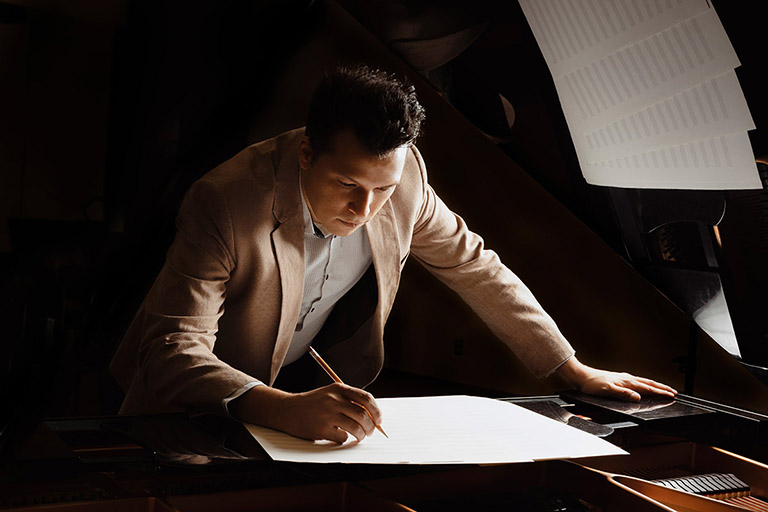Josh Rodríguez continues to gain recognition as an emerging composer and collaborator on a national and international scale. Born in Argentina and raised in Guatemala, Mexico and the United States, Rodríguez’ musical imagination has been formed by this bilingual multicultural heritage. Rodríguez currently serves as Associate Professor of Music Theory and Composition at the Elmhurst University and is an Associate Fellow of the KLC. To hear his music, visit YouTube, Instagram and his website https://www.joshrodriguezmusic.com.

Christianity is often not restful for the church or for anybody else.
Salvation, sabbath, sleep, stillness and sanctuary. God has given us these kinds of rest … and Black music can be seen as a resource to help us practise them.
– Julian Davis Reid
Josh Rodríguez interviews Julian Davis Reid who trained at Yale College (B.A. in Philosophy) and Emory University’s Candler School of Theology (MDiv). Reid sees himself as an “artist-theologian” and his work certainly reflects this calling: he is equally comfortable with preaching, writing, and creating and performing music. Julian, now based in Chicago, manages several projects including a jazz-electronic fusion group he co-founded called The JuJu Exchange, his own original music project called Julian Davis Reid’s Circle of Trust, and Notes of Rest, a spiritual formation ministry. The following is a lightly edited email exchange about how jazz can minister today.
You can hear Julian’s music and join the Notes of Rest journey at www.juliandavisreid.substack.com.
Josh Rodríguez: During the pandemic, you began a ministry called Notes of Rest. What is the aim of this ministry and why do you feel that it is important today?
Julian Davis Reid: Notes of Rest is a spiritual formation ministry grounded in Scripture and Black music that invites the body of Christ to receive God’s gifts of rest. During the pandemic I was burdened by how much restlessness I saw in the church and surrounding world. We were weary of staying at home and being cocooned by the threat of the pandemic, and the essential workers amongst us were dying trying to take care of us. We all needed rest. And it was during this time that I realized I could help us practise rest and reflect on it theologically and musically through combining my loves for theological education with music, and thus, Notes of Rest. The goal is to walk people through in-person experiences and online curricula that help their communities practise different kinds of rest God has given us: salvation, sabbath, sleep, stillness and sanctuary. God has given us these kinds of rest present in Scripture, and Black music can be seen as a resource to help us practise them.
Notes of Rest addresses three problems: Christianity is often not restful for the church or for anybody else. Rest is too often regarded merely as a commoditized good (e.g., just buy a new mattress or take a vacation). Black music is not seen as formative (but rather as mere entertainment or relaxant.) The way I stitch together Scripture and Black music in communities helps people see that God, through Jesus, has called us to diverse notes of rest, that rest is inherently a spiritual matter, and that Black music can form us to desire rest. This is why this project is called a spiritual formation ministry.
Rodríguez: I’m intrigued by The JuJu Exchange’s latest endeavour – JazzRx. You’ve set out to engage your audience with a “trust-building exercise” in which you ask people to send a personal story of “love, pain or anything in between,” and you then create music inspired by that story. What sorts of stories have come your way? What is the creative process like?
Reid: That project has been a gift of ministry to the wider world. Our fans on Patreon have sent us a wide range of prompts to which we’ve responded with sonic medicine. We made music in response to prompts about miscarriage, about incarcerated persons re-entering society, about vaccines to COVID on the way (back in 2021) and about incurable sadness. In response, we took our time crafting musical sketches to accompany them along the path of their pain or joy.
Rodríguez: “Music as medicine” seems to be a recurring theme in your musical life. Does this come from specific musical experiences you’ve had? What music helps you heal?
Reid: Great question. Because I grew up in a Black church space and still attend a church, Renewal Church of Chicago, that is grounded in Black church music traditions, Black music always helps me heal – old Anglophone hymns, traditional choral gospel songs and Black modern-day praise music. And of course, all jazz records I’ve been listening to have helped me heal. My deepest entry points have been with Herbie Hancock, McCoy Tyner, Thelonious Monk, Wynton Kelly and of course most things Miles Davis. The work of Miles Davis’s Second Great Quintet is my favourite music on earth: Tony Williams, Ron Carter, Herbie Hancock and Wayne Shorter. I still can’t believe those cats made all of those records together. Robert Glasper is a newer voice who really helps me receive and heal too.
Finally, the music I make also helps me heal. The record I made with The JuJu Exchange this year (2023) called JazzRx is literally all about helping people heal and thus I healed with them for, as Richard Rohr notes, we are all bound together in the circle of life. But my solo artistry has also been a site of my own healing. My newest record, Candid EP, chronicles my journey into being a solo artist, which has been a journey of healing. I took that one song, “Candid,” and played it in various settings over the course of several years. And when I listen back to the record, I hear how I have been healing from wounds about being an artist, wounds inflicted by myself and by society around me. I have believed too many lies, that music is frivolous or not a real profession, or that I cannot compose and write exactly what I want to say, only what someone else would rather I say. And so, over the course of the record you hear me opening up slowly but surely: me being candid with myself and with God and with you. The arc of that recording bends towards the joy of the Lord.
Rodríguez: I’d like to conclude with a question about literature. Like you, many of our readers are interested in the intersection of theology and culture and are familiar with people like Abraham Kuyper and C. S. Lewis. For readers who are unfamiliar with Black theologians exploring similar topics, who would you recommend that they read?
Reid: Here is a smattering: James Cone (The Spirituals and the Blues, The Cross and the Lynching Tree), Delores Williams (Sisters in the Wilderness), Willie James Jennings (The Christian Imagination; Acts: A Theological Commentary), Jay Kameron Carter (Race: A Theological Account), Howard Thurman (Jesus and the Disinherited), Barbara Holmes (Joy Unspeakable: Contemplative Practices of the Black Church), Emilie Townes (Towards a Womanist Ethic of Incarnation), Tricia Hersey (Rest is Resistance: A Manifesto) and Karen Baker-Fletcher (Dancing with God: Trinity from a Womanist Perspective).


The Kirby Laing Centre for Public Theology in Cambridge. Charity registered in England and Wales. Charity Number: 1191741
Kirby Laing Centre, The New Mill House, Unit 1, Chesterton Mill, French’s Road, Cambridge, CB4 3NP
© 2022 The Kirby Laing Centre for Public Theology in Cambridge